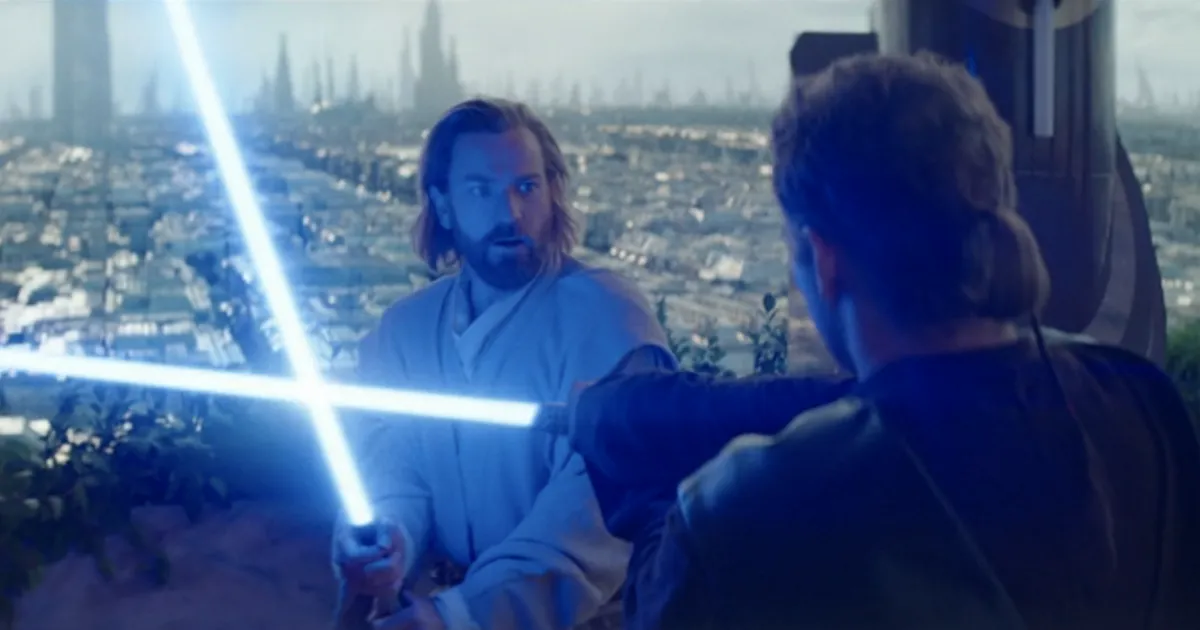Image courtesy Lucasfilm via CNet.
[Minor spoilers ahead for episode 5 of Obi-Wan Kenobi.]
I guess I am on a Star Wars theology kick right now. In episode 5 of Obi-Wan Kenobi, a focal point of the narrative involves regular flashbacks to a lightsaber sparring session between Obi-Wan and Anakin, set during the Star Wars prequel era. It’s a treat to finally get to see Christianson as Anakin for an extended period, but these scenes are more than nostalgia: they tell (or perhaps remind us) of a long-standing fatal character flaw in Anakin that Obi-Wan will use to escape in the present. At one point in the flashbacks, they stand back-to-back holding their sabers, and Anakin says to his Master, “Mercy doesn’t defeat an enemy, Master.”
This of course reminds us of the pivotal scene near the end of episode 6, Return of the Jedi, in which Luke refuses to fight his father, Anakin. That mercy, that refusal to meet force with force, ultimately disarms Anakin and leads to the Empire’s defeat.

This connects to something I just re-read from Henri Nouwen. I recently released a podcast episode about this section of Return of the Prodigal Son, which is my favorite of Nouwen’s many books. Near the end of this beautiful reflection, he wrestles with the call to become the Father. Here he means both the father from the story of the Prodigal Son, and the loving Father whose character that story reveals:
“Is there a way to this spiritual fatherhood? Or am I doomed to remain so caught up in my own need to find a place in my world that I end up ever and again using the authority of power instead of the authority of compassion? Has competition so pervaded my entire being that I will continue to see my own children as rivals? If Jesus truly calls me to be compassionate as his heavenly Father is compassionate and if Jesus offers himself as the way to that compassionate life, then I cannot keep acting as through competition is, in fact, the last word. I must trust that I am capable of becoming the Father I am called to be.”
The Return of the Prodigal Son, p. 128.

Nouwen’s dichotomy between “the authority of power” and “the authority of compassion” is easy to dismiss, at an initial glance. How can compassion convey authority?
Star Wars offers an answer to that. The compassionate Obi-Wan, with no need to prove himself, is arguably the most powerful Jedi of the entire saga. Anakin’s son, influenced by the loving Uncle Owen, Obi-Wan, and Yoda, defeats Darth Vader in part by refusing to fight.
Here there are echoes of the Christ Hymn from Philippians 2. Many scholars believe this is Paul’s quotation of a hymn already circulating in the embryonic church. The song praises Jesus,
Who, being in very nature God,
Phil. 2:6-8 (NIV)
did not consider equality with God something to be used to his own advantage;7 rather, he made himself nothing
by taking the very nature of a servant,
being made in human likeness.
And being found in appearance as a man,
he humbled himself
by becoming obedient to death—
even death on a cross!
His love was so strong it went to the cross, overcoming sin, death, and the devil not with an exercise of power but with compassionate obedience.
Anakin becomes Darth Vader. Or – “from a certain point of view,” to quote Obi-Wan – Vader kills Anakin. Lucas got the name Darth Vader from the German for ‘Dark Father.’ So here, then, are two kinds of Fatherhood. The compassionate fatherhood of Owen and Obi-Wan, contrasted with the power-wielding authority of dark fathers like Palpatine and Vader.
Our world largely runs on the authority of power. Churches, corporations, government – you name it, the institution is probably in many ways an exercise of power. Scripture, as narrated so well by Nouwen, invites us to understand a different kind of power, a cross-shaped power. And just perhaps, however unconsciously, the Star Wars saga in its various iterations offers an echo of this deep truth: the ‘force’ that enlivens, orders, and will finally redeem the universe is not naked power but self-giving compassion.
In the end, mercy defeats our true enemies: sin, death, and alienation from God.
